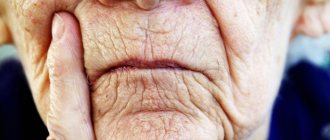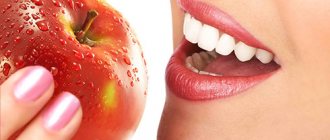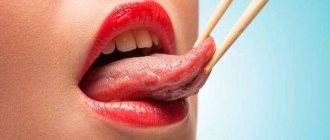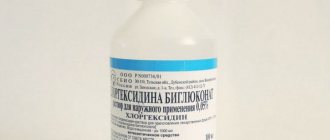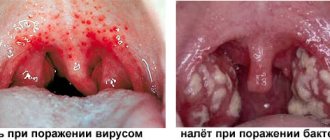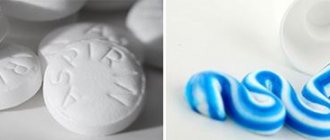Dry mouth at night is a known phenomenon that can be caused by external factors, in particular diet, and is not considered to be significantly dangerous. But sometimes this can be a sign of one of the serious illnesses. Doctors call this phenomenon xerostomia, which can be presented in a transient form or occur constantly. It depends on the reasons that initiate dry mouth at night. Regardless of the factors that provoke such phenomena, it is safer to prevent the onset of xerostomia than to deal with its consequences. The result of a small amount of saliva can be dental nuances, digestive difficulties, and the development of fungal diseases. To do this, you need to study the reasons that cause tightness in the mouth and learn how to eliminate them.
What does dry mouth mean?
Dry mouth is otherwise called xerostomia and refers to dehydration of the oral mucosa due to insufficient secretion of the salivary glands. This can be expressed differently among people. Some people simply feel a slight desire to drink water, and after that the unpleasant symptom goes away, while others suffer constantly due to dryness. At the same time, it becomes difficult to speak fully and swallow food, which significantly worsens the patient’s quality of life.
Dry mouth makes you constantly want to drink water
Thirst, cracked lips, burning tongue and other associated symptoms
People also note other associated symptoms:
- a feeling of stickiness, the tongue “sticks” to the palate;
- constant presence of thirst;
- the appearance of cracks on the lips and corners of the mouth;
- irritation of the oral mucosa;
- feeling of dryness in the larynx;
- burning and itching of the tongue. It turns red, becomes rough, cracks;
- disturbance of taste sensations;
- voice change. He sits up and becomes hoarse;
- the spread of dryness to the nasal cavity, the occurrence of unpleasant sensations during breathing;
- the appearance of bad breath.
Preventive recommendations
Some factors that provoke dry mucous membranes are practically impossible to combat (autoimmune pathologies) or impractical (hormonal imbalance during pregnancy). In other cases, simple rules prevent unpleasant symptoms in the oral cavity.
Preventive measures:
- drinking enough fluids throughout the day;
- good hygiene of teeth and gums, use of high-quality toothpaste that does not irritate delicate tissues;
- timely treatment of acute forms of diseases, control of chronic pathologies;
- prevention of nasal congestion;
- avoiding the constant use of mouthwashes containing alcohol. Alternate formulations with active and softer properties;
- consult a doctor in time to cancel (replace) medications that reduce saliva production;
- do not injure the mucous membranes, prevent infection from entering from unwashed vegetables/fruits, through shared dishes or toothbrushes;
- During/after courses of radiation to the upper body, visit your dentist to monitor your oral health. With radiation therapy, sometimes not only dry mouth develops, but also a dangerous disease - osteonecrosis (destruction of the jaw bone);
- Maintain an adequate level of humidity in your living space. Constantly running air conditioning and central heating radiators are one of the reasons for insufficient hydration of the mucous membranes;
- do not smoke at night, do not drink strong alcohol in the evening, avoid salted/smoked fish during dinner. Unfortunately, patients in dental clinics who complain of cracks, ulcers, and irritation of the mucous membranes often violate these simple recommendations.
If xerostomia occurs frequently during sleep, do not self-medicate. A glass of water will temporarily relieve unpleasant symptoms, but will not solve the problem. Only after examination and identification of the causes of dry tissue in the mouth can complex therapy begin. Visit a dentist or specialists, and you will certainly eliminate the factors that interfere with your normal life.
Find out more interesting information about methods of eliminating dry mouth from the following video:
Causes of dry mouth in the morning, evening and night
There can be a huge number of reasons for dry mouth. This does not always indicate a serious illness; sometimes it can be a temporary condition of the body due to exposure to external factors or the use of any substances.
Dehydration
Dehydration due to not drinking enough water is the most common cause of dry mouth. This can also occur during exposure to heat, due to excessive sweating and excessive consumption of salty foods.
In addition, burns to a large percentage of the body can result in severe loss of body fluids.
People become dehydrated due to not drinking enough water
Discomfort after taking medications
Unpleasant sensations can be caused by the use of various medications, one of the side effects of which is dry mouth. Such drugs include some diuretics, antitumor drugs, psychotropic drugs, antiallergenic drugs, antibiotics, m-cholinergic receptor blockers, various stimulants, and vasodilators.
Dry mouth at night associated with runny nose and snoring
Rhinitis (runny nose) is also a very common cause of dryness, especially in the morning after waking up or even throughout the night. When the nose is stuffy, a person begins to breathe through the mouth, which leads to a dry mouth.
Snoring during sleep leads to the fact that throughout the night the patient may feel dry mucous membranes due to mouth breathing.
Using rinse aids
Frequently rinsing your mouth can also cause this symptom. Excessive use of rinses containing alcohol washes away the natural plaque from the tongue and dries out the oral cavity.
Dry air
Low air humidity can also lead to xerostomia. A person breathes dry air, which affects the mucous membrane and increases the viscosity of saliva. The minimum humidity in the room should be 40%.
Bad habits: smoking, alcohol
Smoking is a very bad habit. Resins and nicotinic acid, getting on the mucous membrane, burn it and the ducts of the salivary glands. People feel a burning sensation on the tongue, in the throat, dryness in the mouth and throat.
Smoking and alcohol are common causes of dry mouth
Drinking alcoholic beverages leads to dehydration of the body. The next morning, people often experience dryness and bad breath.
Climax
Menopause is a natural period for women; it begins around the age of fifty. During menopause, the levels of progesterone and estrogen change, which leads to dryness of all mucous membranes of the body.
Vitamin deficiency
A lack of vitamin A greatly affects the condition of the entire body. Dryness is felt not only in the mouth, insufficient hydration leads to the fact that the skin begins to peel, hair and nails become brittle and brittle. Due to vitamin deficiency, the restoration processes of epithelial cells are disrupted, they are intensively desquamated and can clog the ducts of the salivary glands, resulting in the formation of a retention cyst.
Stress, depression
Nervous overexcitation, stress, and depression can also contribute to the appearance of this symptom. Patients often suffer from insomnia. Typically, dry mouth goes away as the person’s mental state normalizes. With nervous eating disorders (bulimia, anorexia), a lack of appetite may also be observed.
Diseases of the gastrointestinal tract causing a feeling of dry mouth
Diseases of the gastrointestinal tract can also cause dry mouth. At the same time, patients often experience other unpleasant and even painful symptoms.
Acute or chronic gastritis
Gastritis is an acute or chronic inflammation of the gastric mucosa. Due to dyspeptic disorders, dry mouth may appear. Patients also note increased gas formation, heartburn, heaviness in the abdomen, belching of air, and seething.
With gastritis, there is increased gas formation, heartburn, heaviness in the abdomen and dry mouth.
Pancreatitis
Pancreatitis or inflammatory diseases of the pancreas can cause dry mouth due to decreased saliva production. Attacks of severe hunger may also occur.
Cholecystitis
Cholecystitis is inflammation of the gallbladder. Patients experience dry mouth and bitterness in the morning due to impaired bile outflow.
Drinking water does not always help get rid of dry mouth
Other pathologies with impaired salivary secretion
There are also other pathologies that can lead to dry mouth:
- Diseases of the salivary glands directly lead to problems with saliva production. In some people, its volume is significantly reduced, while in others, secretion stops altogether. Many patients also note pain on palpation and swelling in the area of the salivary gland. It can increase significantly in volume, which leads to inconvenience when swallowing. Also, injuries to the jaw and submandibular area can lead to rupture and stopping saliva production. After eating, due to insufficient secretion, the mouth immediately feels dry.
- Impaired conduction of the glossopharyngeal and facial nerves. This can lead to a disorder of the innervation of the salivary glands, as a result of which saliva production decreases.
- Anemia, in which the hemoglobin content in the blood decreases, leads to increased fatigue, dizziness, shortness of breath, and dry mouth.
- Oral candidiasis provokes the appearance of a white coating on the tongue and whitish saliva. The action of the fungus causes the mucous membranes to dry out, become irritated, and ulcers may occur.
Oral candidiasis can cause dry mouth
- Infectious diseases lead to increased body temperature and intense sweating, which affects the water content in the body. Dehydration gradually develops. This is especially pronounced if there is an intestinal infection, which is accompanied by bouts of vomiting, loose stools and weakness.
- Diabetes mellitus consists of insufficient production of insulin, as a result of which the glucose content in the body greatly increases. All metabolic processes are disrupted, patients experience a feeling of thirst, and lose weight due to increased urine output, which releases a lot of water. This leads to the fact that the salivary glands are unable to function normally, the mouth is constantly dry, and severe thirst is tormented. Some people have a daily urine volume of up to six liters. Often, patients may also experience sweetness in the mouth, which is sometimes accompanied by a metallic or other unpleasant taste.
- Diseases of the brain in which disruptions occur in the regulation of the secretory function of the salivary glands. These complications are especially common in strokes, Parkinson's and Alzheimer's diseases, and trigeminal neuritis.
- Thyrotoxicosis (increased activity of the thyroid gland), in which patients produce an excess amount of hormones that gradually begin to poison the body. Irritability appears, pain in the abdomen, sleep is disturbed, the pulse increases, and a lump is felt in the throat. People complain of frequent diarrhea and vomiting, which contribute to dehydration.
- Diseases of the urinary system, such as urethritis, cystitis, prostatitis, nephritis, can also contribute to the appearance of xerostomia.
- Cancerous and benign tumors that affect the salivary glands also lead to dry mouth. This can happen due to various reasons. If the patient has been prescribed treatment with ionizing radiation, this can destroy the gland tissue. Also, the neoplasm can compress the ducts. For these diagnoses, surgical removal of the glands may be prescribed.
Very often, dry mouth is associated with diseases of the salivary glands.
Rare diseases that can cause a feeling of dry mouth
Systemic diseases, also called autoimmune or rheumatic, can also lead to dry mouth:
- Systemic scleroderma is a connective tissue disease that disrupts the structure of internal organs, skin, and joints. Due to lesions of the mucous membranes, severe dryness is felt in the oral cavity.
- Sjogren's disease has another name - dry mucous membrane syndrome. It is most often found in women over 40 years of age. The lacrimal, sweat, vaginal and salivary glands are affected. They may be painful on palpation, and body temperature rises.
- Cystic fibrosis is a very severe congenital disease in which the exocrine glands are damaged. There is also a dysfunction of the respiratory, digestive and other body systems. The first symptoms are noticeable after birth; children have viscous saliva, poor weight gain, fingers and lips may turn blue, and the mouth feels dry.
Prolonged sun exposure contributes to dehydration
What other causes of constant dry mouth are there?
If saliva is secreted normally, but dry mouth still remains, then this may be due to the following reasons:
- changes in the composition and consistency of secreted saliva;
- dental diseases;
- heavy physical activity;
- dry snacks.
You can do a simple dehydration test at home.
Main causes of dry throat
The mucous membrane is often irritated by prolonged conversations, screaming, and singing. Symptoms include itching, scratching, and dry throat. The most vulnerable are people with typical professions, for example, teachers, readers, singers, and tourist guides. Irritation and damage to the mucous membrane opens nerve endings
. Therefore, a painful dry cough appears, which greatly interferes with a person’s daily work.
Most often, dryness, hoarseness and scratching in the throat appear due to the following reasons
:
There are other causes of dry throat. The first five reasons listed do not require treatment
, which cannot be said about the sixth. We are interested in the issue of the appearance of dryness due to infection, since it must be treated in a timely manner so that the pathological process does not spread further.
Diagnosis and differential diagnosis
If you experience dry mouth, you should consult a physician. If necessary, he will refer you to an endocrinologist, rheumatologist or dentist. After an initial examination and medical history, the doctor will prescribe additional diagnostic methods to clarify the diagnosis. Depending on the indicators, the patient is referred for various laboratory tests.
- A complete blood count is a standard method for diagnosing certain diseases. If a lack of hemoglobin and red blood cell levels is detected, this may indicate anemia and scleroderma. An increase in leukocytes indicates the presence of a serious inflammatory process.
- A general urine test helps identify scleroderma in the presence of red blood cells, protein, cylindrical casts and a large number of leukocytes.
- Determining blood glucose levels is necessary to diagnose diabetes. An increase in sugar content of more than 5.5 mmol/liter is an alarming symptom.
- A blood test for hormone levels is necessary if thyrotoxicosis is suspected. When it occurs, the level of T3, T4 increases, and the content of thyroid-stimulating hormone decreases.
- A biochemical blood test for vitamin deficiency will show a retinol level of less than 100 mcg/l, and a carotene level of less than 200 mcg/l.
- Enzyme-linked immunosorbent assay (ELISA) can detect antinuclear antibodies, which indicate scleroderma.
- A serological blood test with a rheumatoid titer of 1:80 indicates Schegner's syndrome.
Normal glucose levels should be from 3.3 to 5.5 mmol/l
In addition to laboratory tests, special hardware diagnostic methods are used, which make it possible to identify various diseases with great accuracy.
- Ultrasound diagnostics (ultrasound) is one of the most common methods with which you can measure the size of the salivary glands and identify tumors, cysts, and stones in them. You can also examine the condition of the kidneys, liver, gall bladder and other internal organs.
- Sialoscintigraphy is prescribed to study the functioning of the salivary glands. This radiation study is performed by introducing a radionuclide drug (technetium, strontium, iodine). Thanks to their movement, it is possible to track how saliva is formed and how freely it passes through the ducts.
- X-rays are prescribed to detect tumors, metastases, foreign bodies, and bone damage.
- Sialadenolymphography is prescribed for the diagnosis of diseases of the salivary glands and metastases in the face and neck.
- Sialometry is necessary to assess the level of salivary secretion. You can evaluate the work of each gland separately. Normally, a healthy person should produce about 1 ml of saliva in a period of 10 to 20 minutes.
- Probing of the salivary ducts is carried out to study patency, and also allows them to be cleared of formed stones.
Probing the salivary ducts not only allows you to assess their patency, but also helps to remove stones formed in them
- A biopsy is prescribed to examine the material taken for the presence of malignant cells.
- Computed tomography and magnetic resonance imaging are modern and very accurate methods that allow us to study in detail the condition of internal organs, including the salivary glands.
Video about three tests for dry mouth
Causes of dry throat
- Viral and bacterial diseases. Pathogenic microflora, having penetrated the respiratory tract, begins to destroy their mucous membrane, causing severe swelling and hyperemia. The processes of cleansing the respiratory organs, including disruption of the ciliary apparatus, lead to constant irritation, sneezing and dry throat. Even several weeks after the onset of the disease, similar phenomena can be observed, this is due to the fact that the epithelial cells in the respiratory tract take a very long time to recover.
- Overexertion when talking, singing. Often found among teachers, kindergarten teachers, singers, event hosts, radio and television announcers. In such cases, there is a clear connection with a loss of voice, after which patients begin to feel scratching in the throat, constant dryness, hoarseness, and pain when speaking. When overstrained, the susceptibility of nerve endings to external stimuli increases sharply, the pharynx and larynx become hypersensitive, during a long conversation a person feels tired from talking, sometimes tension or spasm of the muscles in the throat.
- Allergic processes. The body's reaction to allergens manifests itself in swelling of the respiratory organs, moderate pain, coughing, lacrimation, and runny nose.
- Smoking. Tobacco use leads to thinning of the mucous membrane of the throat, its gradual atrophy, and loss of protective functions. Dryness occurs as a constant phenomenon, which increases in proportion to the cigarettes smoked.
- Professional activities related to the production or use of harmful chemicals. In these cases, the reagent molecules settle on the patient’s mucosa, causing various damage to its cellular structure.
- Use of air conditioners or heaters for heating rooms. This leads to a decrease in humidity in it, drying out the air, inhaling which people can experience a lot of unpleasant sensations in the upper respiratory tract (nose, throat, larynx).
- Chronic respiratory diseases, autoimmune diseases:
- Sjögren's and Graves' syndromes;
- hypothyroidism or thyrotoxicosis;
- diabetes, obesity;
- kidney disease;
- tumors.
- Diseases of the esophagus, its reflux. In this case, the throat is irritated by the reflux of acidic contents, which is the reason for its dryness.
- Side effects of medications (diuretics, antiallergic and blood pressure-lowering drugs), their long-term use contribute to the occurrence of pathological changes in the respiratory organs.
- Dehydration. This process occurs with severe intoxication of the body, infections, inflammatory diseases, metabolic disorders, hypovitaminosis, chronic alcoholism.
How to eliminate dry mouth
Currently, there are no medications that deal only with dry mouth. To get rid of this symptom, therapy for the underlying disease is necessary. You should also avoid using mouthwashes that contain alcohol.
If you experience dry mouth, you should drink regular drinking water, this may help get rid of this symptom. Remember that sweet and carbonated lemonades only make the situation worse. Sometimes chewing gum or sour candy helps, which promotes salivation.
Cevimeline, Imudon and other medications to eliminate unpleasant symptoms
Medicines are selected individually based on the primary disease. Most often prescribed:
- Inhalations to eliminate dry mouth with products containing herbal components (Vitaon).
- Vitamin complexes. Necessary for vitamin deficiency (Complivit, Alphabet, Supradin).
- Remedies for the common cold. They help get rid of rhinitis and eliminate dry mouth during sleep (Rinostop, Snoop, Sanorin, Naphthyzin).
- Phytoestrogens. Necessary during menopause (Qi-Clim, Inoklim, Feminal).
- Immunomodulating drugs. Prescribed to increase the body's resistance (Imudon).
- Drugs to enhance saliva secretion (Cevimeline, Pilocarpine). Sweating is also stimulated.
- Gel to increase saliva production Xerostom. Since it does not contain sugar, it can be taken for diabetes.
- Enveloping gel based on silicone and Biotene polymers. Moisturizes the oral cavity and prevents saliva evaporation.
- Sprays to replace natural saliva (Hyposalix). Significantly improve the condition of patients with xerostomia.
- Antibacterial sprays (Bioxtra). They prevent the appearance of caries and form a special film that protects the mouth from drying out.
- Hydrating agents to restore electrolyte balance (Regidron, Trihydron, Gidrovit).
Medicines that help get rid of dry oral mucosa - photo gallery
Bioxtra - a saliva substitute with antibacterial enzymes Xerostom - a saliva substitute for dry mouth Biotene softens the oral mucosa, eliminates irritation and tightness Vitaon eliminates dry mouth Hyposalix improves the condition of patients with xerostomia The mechanism of action of the drug Imudon is based on the activation of the body's own defenses B vitamins The Complivit mineral complex contains vitamins and minerals necessary for human health Regidron - a drug for correcting energy and electrolyte balance Snoop - helps get rid of rhinitis and eliminate dry mouth during sleep Qi-Klim - an anti-menopausal herbal remedy
Diet: allowed and prohibited foods
If you have xerostomia, you should avoid foods and drinks that lead to dehydration:
- pickles;
- chips, crackers, snacks;
- dry foods;
- coffee and any other drinks containing caffeine;
- alcohol.
When dehydration occurs, it is worth consuming foods that contain a large amount of electrolytes:
- tomatoes;
- raisin;
- nuts;
- watermelon;
- melon;
- spinach;
- potato;
- bananas;
- oranges, tangerines, lemons;
- green vegetables.
It is also worth including foods containing large amounts of Omega-3 fatty acids in your food - flaxseed and olive oil, sea fish. They help moisturize the skin and mucous membranes.
Eat foods high in fiber, as they require thorough chewing, which produces large amounts of saliva.
Fermented milk products help saturate the body with electrolytes, which reduce the risk of dehydration.
How to drink water
It is also very important to drink water in the right amount and in a certain way:
- per kilogram of weight you need 40 ml of water per day;
- It is useful to drink one glass of warm water after sleep on an empty stomach;
- It is worth increasing your water consumption if you engage in heavy physical labor or sports;
- It is not recommended to drink while eating. It is better to drink a glass of water 1.5 hours after eating;
- It is necessary to monitor the water temperature, it should be approximately 380C.
In addition to dehydration, the human body can also suffer due to excessive consumption of water. It is very important to correctly calculate the required daily intake so as not to harm your health.
Video about proper water consumption in Elena Malysheva’s program “Live Healthy!”
Traditional treatment
In most cases, the treatment of diseases whose symptom is dry mouth cannot be done without medication. However, after consulting a doctor, you can use various folk remedies that will help speed up recovery.
- In the absence of diseases of the gastrointestinal tract, you can add dried or fresh chili peppers to dishes. Its use increases the secretion of saliva.
- You can chew a slice of fresh lemon without adding sugar to it.
- It is useful to chew on a piece of ice. Gradually dissolving, it will moisturize the oral cavity and the surface of the tongue.
- You can inhale with soda and salt (1 tsp each) dissolved in one liter of water. The duration of the procedure is 10–15 minutes.
With the help of inhalations, you can not only saturate the mucous membranes with moisture, but also get rid of rhinitis
Inhalations with herbal decoction
To prepare this product:
- Take calendula, lemon balm, chamomile, and mint in equal proportions.
- Grind all ingredients in a blender.
- Pour one tablespoon of the mixture into a glass of water.
- Simmer over low heat for ten minutes, strain.
The resulting product can be used together with an inhaler or breathed over a saucepan, covered with a towel. The duration of the procedure is fifteen minutes.
Lemon water
Lemon juice helps hydrate the body and also saturates it with vitamins and energy. For preparation:
- Take one glass of water at room temperature.
- Add one teaspoon of acacia honey and squeeze half a lemon.
- Drink this drink daily in the morning on an empty stomach for one month.
Drinking lemon water on an empty stomach saturates the body with vitamins as effectively as possible.
Rehydration solution
In case of severe dehydration and lack of electrolytes, it is necessary to prepare a rehydration solution. For this:
- Dissolve 5-6 teaspoons of sugar and half a teaspoon of table salt in one liter of water at room temperature.
- Mix thoroughly and drink in small portions until the condition returns to normal.
Barley decoction
This product allows you to quickly restore a dehydrated body and fill it with missing minerals. For preparation:
- Pour one spoonful of barley into a glass of water.
- Bring to a boil and simmer over low heat for ten minutes.
- Leave the broth to cool and then strain it.
- Before use, add half a spoonful of honey and two tablespoons of freshly squeezed lemon juice.
Drink this remedy every day before eating in the morning for three weeks.
Barley is rich in selenium and helps protect the skin and mucous membranes from harmful effects.
Treatment methods
To eliminate the causes of dry mouth at night associated with pathology, treatment of the underlying disease and drugs to normalize the functioning of the salivary glands are prescribed. To relieve symptoms, artificial moistening of the mucous membrane is carried out with saliva substitutes in the form of a gel or spray Hyposalix, Aquoral, Salivart.
Drugs that increase the resistance of the mucous membrane to irritants and local anti-inflammatory drugs are used. To treat complicated snoring, which causes severe drying of the mouth at night, laser radiation and CPAP therapy are used.
How to help yourself
To compensate for tissue dehydration, you need to drink more herbal teas based on chamomile, mint, apple and orange juice during the day. Moisturize the oral cavity with an isotonic sodium chloride solution or Lakalut Flora rinse, which contains olive oil. Rinse liquid "Bioten with calcium" eliminates dryness and destroys bacteria.
If your mouth gets dry at night, place a glass of water with lemon juice or herbal tea by your bed. Suck on a piece of ice or a sugar-free candy before bed. During sucking, the secretion of saliva is activated.
Softening the mucous membrane with pharmaceutical and home remedies will help get rid of the unpleasant symptom. You can treat your tongue and oral cavity with olive oil, sea buckthorn oil, and an oil solution of vitamin A. Metrogil-denta ointment will remove plaque on the tongue and eliminate unpleasant odor.
Increased salivation is stimulated by lemon, pineapple, grapefruit, cranberry juice, and red hot pepper added to food.
Inhalations, which are preferably carried out before bedtime, will help eliminate dry mouth. You can breathe over herbal mixtures of chamomile, calendula, mint, and lemon balm. Inhalation with Karavaev’s balm “Vitaon” stimulates the process of salivation. The product consists of extracts of medicinal plants, camphor, and orange oil dissolved in olive oil. For inhalation, 15 drops of the oil mixture must be dissolved in a liter of hot water at 50-60 °C. Breathe for 5-7 minutes.
If you have a dry mouth, it is recommended to drink freshly squeezed carrot juices and natural honey. Carrot juice moisturizes dry mucous membranes and kills bacteria.
The duration of therapy for xerostomia depends on the underlying disease and the degree of dysfunction of the salivary glands. If dry mouth at night is caused by physiological factors, treatment at home helps to quickly get rid of the painful symptom.
How to prevent your mouth from drying out at night
In most cases, drying out of the mucous membrane to a desert state can be prevented if:
- Drink at least 2 liters of water;
- Humidify the room;
- Avoid alcohol and salty foods in the evening;
- Do not use mouth rinses containing alcohol;
- Avoid chronic diseases of the nose and paranasal sinuses;
- Breathe exclusively through your nose. Take measures to normalize breathing and prevent snoring.
Note! If you experience frequent and prolonged symptoms of dry mouth at night, do not self-medicate. Make an appointment with a specialist to identify the cause and adequate treatment.
List of used literature:
- Zepelin H. Normal age related changes in sleep // Sleep Disorders: Basic and Clinical Research / ed. by M. Chase, E. D. Weitzman. - New York: SP Medical, 1983.
- Foldvary-Schaefer N., Grigg-Damberger M. Sleep and epilepsy: what we know, don't know, and need to know. // J Clin Neurophysiol. — 2006
- Poluektov M.G. (ed.) Somnology and sleep medicine. National leadership in memory of A.N. Vein and Ya.I. Levina M.: “Medforum”, 2016.
Treatment prognosis and possible complications
Dry mouth itself is not a life-threatening symptom, but complications can arise due to the underlying medical conditions. People have an increased risk of gum inflammation, tooth decay and thrush. Those who use dentures may have difficulty wearing them due to dry mouth. The functioning of taste buds also decreases, and it becomes more difficult to distinguish between different types of food.
When dehydrated, the following dangerous changes occur in the body:
- the functioning of the gastrointestinal tract is disrupted;
- transport of nutrients to internal organs deteriorates;
- blood pressure increases;
- attention and memory are impaired;
- immunity is weakened;
- premature aging begins;
- severe headaches appear;
- stones and sand form in the kidneys;
- feeling tired quickly;
- sclerosis occurs;
- the body is poisoned due to delayed removal of toxins;
- the functioning of the kidneys and liver is impaired;
- cartilage is destroyed and thinned.
Video about a home test for dehydration in Elena Malysheva’s program “Live Healthy!”
Prevention
You can prevent the occurrence of this unpleasant symptom by taking care to maintain the required level of humidity in the room through systematic ventilation or the use of an ionizer.
Smokers need to get rid of harmful addictions, not use tobacco indoors (it is better to always go outside to at least slightly reduce the harmful effects of nicotine on the human respiratory system), and lead a healthy lifestyle.
It is important to consult a doctor in a timely manner and complete the course of treatment if infected with viruses and bacteria, and follow medical recommendations during the period of recovery and rehabilitation.
Romanovskaya Tatyana Vladimirovna
Dry throat can be caused by various reasons. Often dry nasopharyngeal mucosa accompanies various diseases, but sometimes the causes are quite banal and not related to the disease.
Let's try to understand this issue and talk about the causes of dry throat, this condition on our website gomer.info.
What causes a dry throat?
One of the reasons may be various diseases that cause dry throat and pain when swallowing. These reasons can only be determined by an otolaryngologist after a thorough examination and examination of the throat, based on clinical symptoms. It can be:
Viral infections
The feeling of dryness can be caused by the most common diseases - colds,... In this case the following appears:
Dryness in the throat, a scratching sensation. Coughing and sneezing also appear. At the same time, the voice becomes hoarse, hoarse. Body temperature may rise, and profuse discharge from the nose.
Bacterial infections
These infections are not as common as viral infections, but their consequences can be more serious. The most common disease that accompanies a feeling of dry throat is pharyngitis. This is an inflammation of the mucous membrane of the throat. Pharyngitis can be caused by: Hypothermia, sudden fluctuations in air temperature, decreased immunity. Sometimes the infection is transmitted through foods, water, and milk that are contaminated with streptococci. Symptoms of pharyngitis:
Redness, swelling of the tonsils, tonsils. Dryness, soreness, pain when swallowing, cough Increased body temperature
In these cases, the mucous membrane of the throat dries out and sticks together from the mucus that covers it and sticks together. Upon examination, the pharyngeal mucosa appears dry, irritated, thinned, but without visible inflammation.
The feeling of dryness in these cases can be periodic or constant, turning into a feeling of tickling and burning. These sensations are especially noticeable during vocal stress, after sleep or when eating.
As we understand, these diseases require medical treatment. Therefore, if you have any other symptoms in addition to a feeling of dryness in your goal, you should consult a doctor.
Other causes of dry throat
External environment
The feeling of dryness may appear as an irritant to the state of the external environment. For example, when inhaling polluted air, during prolonged, frequent smoking, after eating too cold or very hot food, as well as microtrauma.
Dry air
The simplest, but quite common cause of dryness is dry warm air (especially during the heating season). Its constant inhalation helps dry out the mucous membranes of the nasopharynx. This problem is often present in children and older people. Due to severe prolonged drying of the mucous membrane, it becomes extremely sensitive.
Mouth breathing
Very often the feeling of a “dry throat” occurs from mouth breathing. This most often occurs during sleep, when a person cannot control himself. Such breathing is usually accompanied by snoring, which irritates the mucous membrane even more. As a result, an inflammatory process may even occur.
Children usually prefer to breathe through their mouth when their nose is blocked. Adults who are tormented or have chronic sinusitis also often breathe through their mouths. All methods of eliminating a runny nose can help here, except for vasoconstrictors. They are addictive, so they should not be used for a long time.
Various nasal deformities can lead to mouth breathing. But in this case, only a specialist can eliminate the cause. How to treat dry throat?
As we have already said, if you suspect a viral or bacterial disease, you should consult an otolaryngologist. He will make an accurate diagnosis and prescribe the necessary. Other cases of dryness not due to infection can be treated with simple home remedies:
If dryness occurs, take a sip of clean, cool water. Place boiled water next to you on the night table. If necessary, drink some water when you wake up.
Saline solution will moisten your throat well and relieve dryness for a while. Place a few drops in your nose during the day and before bedtime with saline solution (0.9% table salt solution). You can buy this remedy at a pharmacy or prepare it yourself. It perfectly moisturizes the throat, eliminating dryness.
Place a few drops of vegetable oil before bed and throughout the day. Flaxseed, carrot, and nut are better suited for this. But if this is difficult, you can completely use olive oil. Try to humidify dry indoor air, especially in the bedroom, using industrial ionizer humidifiers. You can simply wet a wide towel and hang it on the central heating radiator. If you use a heater, place a metal bowl of water in front of or under it. For more effective treatment, it is necessary to establish the root cause of dryness and eliminate it. Therefore, if you have a dry throat for a long time and the measures you have taken do not bring results, consult a doctor for advice. Be healthy!
Contents
Almost all people experience a dry throat at some point. These are unpleasant sensations that are often accompanied by pain, soreness, and a change in voice. Often this ailment is a harbinger of some diseases, for example, diseases of the nasopharynx.
The exact causes of this problem should be established only by an experienced doctor - an otolaryngologist, who will carefully examine the cavity. Dry throat is often a companion to the following diseases:
- Angina;
- Cold;
- Allergic reaction.
Features of symptoms in older people, women
Sometimes dry mouth can appear due to age-related changes, as well as during menopause or pregnancy in women.
If a pregnant woman has dry mouth accompanied by a metallic or sour taste, this may indicate gestational diabetes. This condition is quite serious and requires observation by a doctor.
Also, during the period of bearing a child, the frequency of urination increases significantly, which leads to increased excretion of fluid from the body.
During menopause, a woman experiences serious hormonal changes, ovarian function decreases, and the production of sex hormones decreases. Patients often complain of weakness, hot flashes, chills, irritability and lack of sleep. There is also dryness in the eyes, vagina and mouth.
In older people, xerostomia may be associated with gradual atrophy of the salivary glands or frequent use of various medications.
Diagnostics
Determining the cause of a dry throat is quite difficult, since it can accompany many conditions and diseases of the body. Therefore, in addition to a visual examination of the pharynx and medical history, doctors prescribe a comprehensive examination using instrumental (pharyngoscopy, biopsy, gastroscopy, etc.) and laboratory (blood sugar tests, general tests, identification of allergic predisposition, etc.) methods.
As a rule, if dry throat is the result of a disease, it is accompanied by a number of other clinical signs:
- with ARVI: fever, chills, runny nose, muscle pain, weakness;
- for metabolic diseases: changes in body weight, emotional disturbances, poor sleep and immunity;
- for gastrointestinal diseases: burning sensation in the chest, dyspepsia.
Prevention: what conditions must be observed
It is important to understand that it is easier to prevent diseases than to treat them in the future. To do this, it is necessary to follow various preventive recommendations:
- treat emerging diseases in a timely manner;
- drink enough clean drinking water;
- stop smoking and drinking alcohol;
- avoid physical activity in hot weather;
- ventilate the rooms or buy a humidifier;
- undergo preventive medical examinations;
- play sports, lead an active lifestyle;
- use hygienic lipstick to avoid chapped lips;
- Avoid using mouth rinses containing alcohol;
- Brush your teeth regularly.
Normally, a person should drink about two liters of clean drinking water.
Don't worry if you experience dry mouth. This may simply be a temporary phenomenon that goes away over a short period. However, if such a symptom has been bothering you for a long time and is accompanied by other signs of disease, you should consult a doctor for diagnosis. Observe daily drinking water consumption standards, monitor your health and promptly treat any emerging diseases.
Treatment
If dryness is caused by natural causes or overstrain of the vocal cords, it is necessary to exclude harmful factors:
- inhalation of dry air, consumption of irritating drinks and food (salty, spicy, carbonated products);
- strong vocal stress;
- maintaining an unhealthy lifestyle: smoking, alcohol abuse, working with harmful substances.
You can soften your throat by drinking warm infusions of anti-inflammatory herbs or milk with honey. Systematic alkaline rinsing will help relieve discomfort in the throat, relieve inflammation and swelling. You can reduce dryness by inhaling with a nebulizer with saline solution or inhaling steam over potatoes or herbal infusion.
When a pathology is identified that causes dryness, the doctor prescribes comprehensive treatment.
- For viral infections, immunomodulatory and antiviral agents are widely used; for bacterial infections, antibiotics are used.
- To treat allergies, it is necessary to avoid contact with irritants and undergo a course of therapy with antihistamines.
- If dryness is caused by reflux disease of the esophagus, you need to consult a gastroenterologist, reduce irritation of the mucous membrane in the acute period and follow dietary recommendations during remissions.
Currently, there is a large selection of pharmacological agents used for local treatment of dryness and sore throat:
- rinsing solutions: Chlorophyllipt, Miramistin, Furacilin, Rotokan, Malavit;
- sprays for irrigation: Tatum-verde, Hexoral, Ingalipt, Kameton, Orasept;
- tablets and lozenges for resorption: Gramicidin, Septolete, Doctor Mom.
Their use is carried out in accordance with medical recommendations.
How to get rid of dryness
If dry mouth at night and in the morning is caused by heat, dry air, or heat stroke, then you can get rid of the symptom by drinking plenty of fluids. In this case, you need to drink clean water or green tea. Carbonated drinks and sweet juices will only worsen the situation. Also, restoring water balance will help with symptoms if their cause is a digestive system disorder or viral diseases.
You can stimulate salivation by chewing gum. Alternatively, you can eat a juicy fruit or vegetable.
Inhalations are an excellent remedy for dry mouth in the morning or during sleep. To do this, you need to use a special solution of salt and soda, which you can prepare yourself. To do this, take one teaspoon each of soda and sea salt, pour a liter of boiling water, and breathe in the steam for 15-20 minutes, covering your head with a towel. It is very important to do this carefully so as not to burn the airways.
Inhalations with a decoction of medicinal herbs: calendula, lemon balm, chamomile will be effective. Mix the herbal mixture, pour boiling water over it, let stand for 15 minutes, then inhale as described above.
It is important to remember that such methods can only be effective if xerostomia is not a symptom of serious pathologies. That is why, before starting treatment at home, it is imperative to consult a doctor to rule out the presence of diseases that need to be treated with a completely different method.
If the above methods fail to get rid of dry mouth, this indicates that pathology may be the cause of severe thirst. In this case, you should definitely go to the hospital.
Drug use, poor diet and snoring
The side effects of taking certain medications can cause your mouth to dry out at night. This happens mainly due to medications used for high blood pressure, allergies, and neurasthenia. Salty and sweet foods can also serve as a trigger for the development of this unpleasant symptom, since they help draw fluid out of the cells.
This problem also affects people who snore during their sleep, since the mucous membranes of the mouth dry out in people who snore during their sleep.
Why does my mouth feel dry in the morning?
The causes of dry mouth during sleep and after waking up are usually identical. However, the appearance of xerostomia after sleep can be associated with serious illnesses. In this case, drinking water is not enough to eliminate the problem, since this action will not lead to positive results. Dry mouth can occur in the following cases:
- strong thirst is pronounced in diabetes mellitus;
- inflammation of the gastrointestinal tract can cause dry mouth;
- liver pathologies cause a reduction in saliva secretion;
- cardiovascular diseases;
- inflammation of the salivary gland;
- radiation for cancer;
- menstruation period and menopause;
- the curvature of the nasal septum does not allow air to fully circulate, so breathing occurs through the mouth, which contributes to the drying of the mucous membrane;
- Hormonal imbalance leads to incorrect functioning of the glands, which can lead to dehydration.
Manifestations of xerostomia should not be ignored. If such a symptom occurs regularly, then it is necessary to understand the cause. To do this, you should contact a therapist who will conduct an examination and help identify the problem. The doctor may order blood tests to determine your sugar levels to rule out diabetes.
Other diagnostic procedures may be needed to help identify the problem. Only after an accurate diagnosis is determined is the necessary therapy prescribed.
